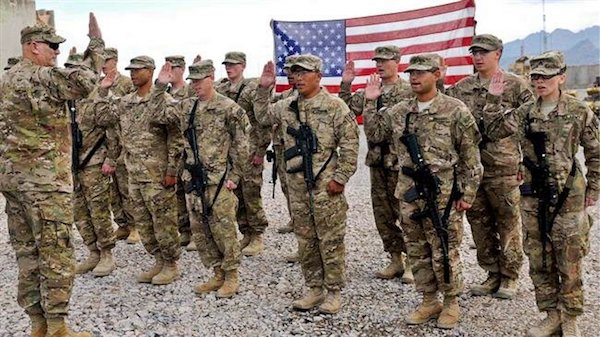
India’s best bet in Afghanistan would be a negotiated withdrawal of foreign troops from Afghanistan, for this would check the Taliban’s proclivity to engage in trouble- making outside Afghan territory.
Donald Trump’s calling off Taliban peace talks is to India’s advantage; an outreach to the outfit could secure it.
It is perhaps for the best that the U.S.-Taliban talks were called off earlier this month. The Taliban leadership’s proposed visit to Camp David in the United States would have led to a slew of significant geopolitical changes with implications for the region and beyond.
Perhaps the Taliban became far too greedy and impatient, or the U.S. President has pulled out what he thinks is the Trump card to gain a negotiating advantage especially given that the American establishment is not too happy with the deal. There were misgivings about the deal that the chief U.S. negotiator to Afghanistan, Zalmay Khalilzad, was about to ink with the Taliban.
Back to square one
The Taliban, having fought against and displaced the powerful coalition forces over the past 18 years, has the luxury of time on its side, even as it is steadily increasing its political legitimacy within Afghanistan. Recall that this is not the first time U.S.-Taliban talks are breaking down, and every time the Americans have had to come around to negotiating again. Mr. Donald Trump on the other hand may not have the luxury of time. As for the international community, it has grown tired of the Afghan story.
In any case, we are back to another season of heavy fighting in Afghanistan with devastating attacks being mounted by the Taliban far more frequently than before.
What implications does the cancellation of U.S.-Afghan talks have for the volatile South Asian region in general and for India in particular?
Implications for Afghanistan
The direct fallout of the American pullout from the negotiations is more bloodshed in the country. The gloves are now off (not that the Taliban was greatly restrained earlier) and the Taliban has already started carrying out major attacks with the American troops fighting back. However, the current dispensation in Afghanistan, led by President Ashraf Ghani, might not be too displeased with the outcome. The September 28 elections are likely to go ahead, and Mr. Ghani has a chance to continue as President without having to share power with the Taliban — a prospect Kabul has been uneasy about for a long time — to the extent that he actively discouraged all talks with the Taliban that did not involve Kabul. The Ghani government will also be pleased with the fact that U.S. troops are likely to continue in the country, for if left alone the government will not survive long.
The larger question that should concern the Afghan people is whether the Taliban is a changed lot or not. The Taliban has been making direct and indirect assertations about how they are a much-evolved group on the question of girls’ education, treatment of women and minorities, among others. But these are claims at best and that is precisely why a deal with the Taliban should include commitments on its domestic behavior.
What it means for India
Even with a properly negotiated deal, the ascent of the Taliban in Afghanistan would have meant a certain amount of regional uncertainty and geopolitical recalibration. Pakistan, for instance, has been counting on the return of the Taliban in Afghanistan which it deeply believes gives it strategic depth vis-à-vis India. Pakistani triumphalism in the context of Afghanistan would have meant pinpricks for India. Now that there is no deal between the Taliban and the U.S., there is likely to be more violence internally within Afghanistan while the external implications would be more or less contained. This calculus might change if and when the Taliban returns to power and foreign troops withdraw.
India’s best bet in Afghanistan would be a negotiated withdrawal of foreign troops from Afghanistan, for this would check the Taliban’s proclivity to engage in trouble- making outside Afghan territory.
A non-negotiated withdrawal of U.S. forces would be the worst-case scenario for India even though that is unlikely to happen. This will mean little check on the Taliban’s behavior at home and in the neighborhood. It will also enhance Pakistan’s ability to control elements of the Taliban for tactical or strategic anti-Indian uses.
Once the Taliban returns to power in Afghanistan, on its own or as part of a power-sharing arrangement, Indian civilian assets and interests in Afghanistan could come under increased pressure. Today, with the Pakistani side up in arms against India, thanks to New Delhi’s Kashmir decision, the possibility of the Taliban going against Indian interests is much higher, if we were to assume Pakistan to be a major influence on the Taliban’s actions.
The Kashmir question
Kashmir in many ways will continue to be at the center of how the emerging geopolitical situation in Afghanistan will impact India. While it is true that a repeat of the late 1980s, when scores of unemployed Afghan fighters turned up in Kashmir at the behest of the Pakistani agencies, is unlikely to happen today for a number of reasons, including due to physical barriers and the amassing of Indian troops on the border, some presence of the Taliban fighters cannot be ruled out. More significantly, however, if a non-negotiated withdrawal of the U.S. forces takes place, it could lead to an open season for Taliban’s regional engagement which could potentially be influenced by Pakistan’s strategic calculations. Even if there is a deal between the U.S. and the Taliban, the fact that the Taliban will have “forced” the Americans out of Afghanistan would provide a shot in the arm to Pakistan, and young Kashmiris who are willing to take up arms against the Indian state. “If a superpower like the U.S. can be pushed out of Afghanistan by the Taliban with help from Pakistan, would it be too difficult to beat India?” is the argument doing the rounds among sections of aggrieved Kashmiri youth.
The manner in which talks between the Taliban and the U.S., were being conducted would have led to negative consequences for New Delhi. To that extent, the breakdown of the Trump-Taliban talks is advantage India. The U.S. and the international community, while picking up the threads of negotiations in the days ahead, will need to ensure that there are enough guarantees built into a deal to disincentivize undesirable external behavior by the Taliban.
India, on its part, needs to reach out to the Taliban, not to recognize it but to engage with it, in its own national interest. In fact, we are already pretty late in this game, and with the Chinese, Pakistanis and even the Russians converging on the importance of the return of the Taliban to the Afghan scheme of things, one wonders whether India will ever be able to make inroads into the higher echelons of the Taliban. In any case, any outreach from the Indian side would make the government in Kabul led by Mr. Ghani, unhappy. This leaves India in a difficult situation. Hence, such an outreach will also need to be carefully calibrated and discreetly executed.
(Happymon Jacob teaches at the Jawaharlal Nehru University, and is the author of ‘Line on Fire: Ceasefire Violations and India-Pakistan Escalation Dynamics’)
